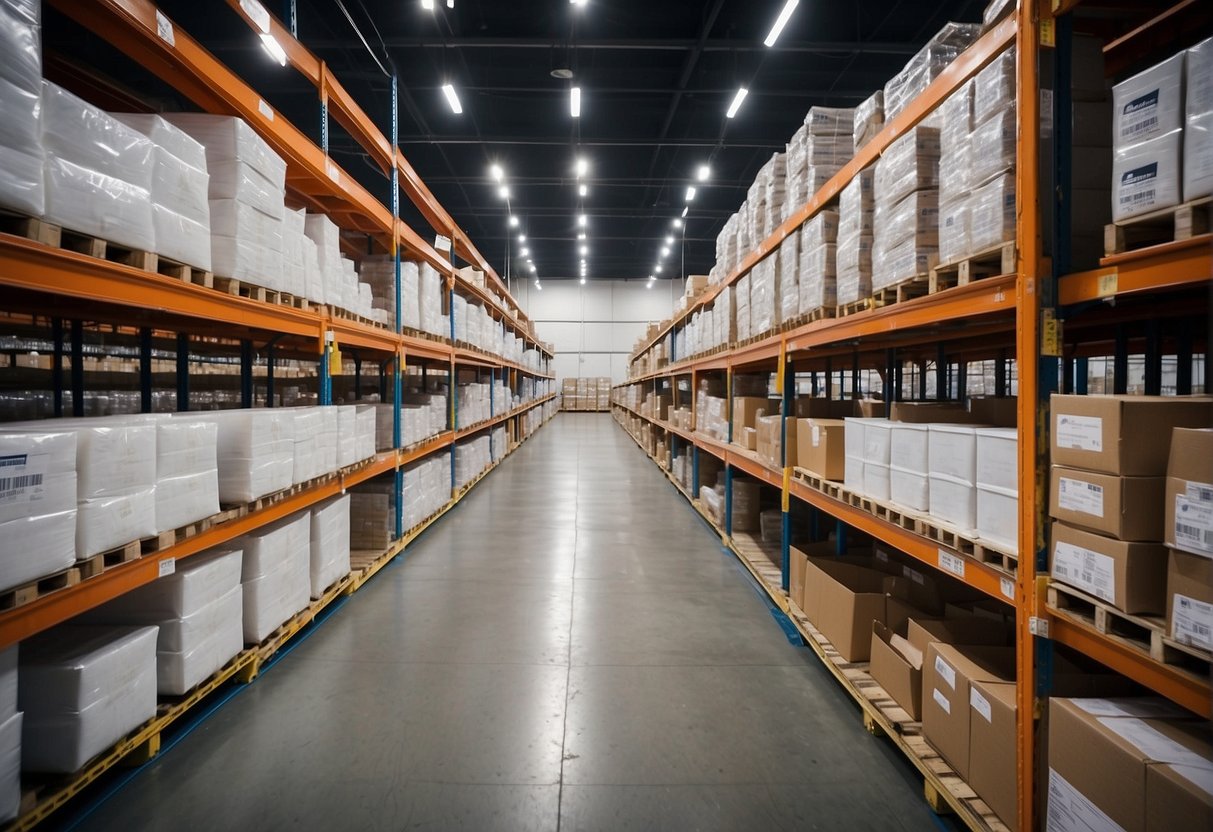When you’re looking to expand your product line or start a new brand, you might consider selling products that you haven’t manufactured yourself.
Two popular methods for doing so are white labeling and private labeling.
In this article, we’ll dive into the key differences between white-label and private-label products, helping you make an informed decision for your brand.

What Are White Label Products?
When you buy a product with a familiar retailer’s brand, but it’s actually produced by a third party, you’re likely dealing with a white-label product. This is a common practice that allows you to enjoy a variety of brands without knowing they come from the same source.
Definition of White Label Products
White-label products are items produced by one company but packaged and sold under another company’s brand name. Essentially, the manufacturer creates a product that retailers can rebrand and sell as their own. This means the product’s brand identity is in the hands of the sellers, not the makers.
How White Labeling Works
In white labeling, a third-party manufacturer creates a generic product that multiple retailers can then brand as their own.
Retailers typically enter a contract with the manufacturer, deciding on the volume, quality control measures, and specifics about packaging and branding.
Once the product is made, the retailer adds their label and handles the distribution in the marketplace.

Common Industries and Product Examples
Common industries that utilize white labeling include:
- Retail and Grocery Stores: Many supermarket and retail store brands are white-label products produced by third-party manufacturers.
- Electronics and Consumer Products: Generic products like DVD players, televisions, and other electronics.
- Software and Web Applications: Software companies often offer white-label versions of their products.
- Financial Services: Smaller banks may outsource credit card or check processing operations to larger banks.
- Apparel and Accessories: T-shirts, tank tops, hoodies, and other apparel
- Home Decor: Wall art, prints, and other home decor items
Pros and Cons of White Labeling for Businesses
Pros of White Labeling:
- Profit margins can be significantly higher due to bulk or wholesale purchasing.
- Quick access to the market, with products that are ready to sell.
Cons of White Labeling:
- Limited control over product quality and features.
- Challenges in differentiation, since other retailers might sell identical products.

What Are Private Label Products?
Private label products are customized offerings that reflect your brand’s unique vision and cater to your customer base. This form of branding allows you to establish a distinct presence in the market and leverage control over product aspects like design and quality.
Definition and Explanation of Private Label Products
Private label products are those manufactured by third parties but sold under a retailer’s brand name. As a business, you oversee the product design and specifications, ensuring that each item aligns with your brand’s vision and customer expectations.
How Private Labeling Works
In private labeling, you partner with manufacturers to produce goods based on your company’s requirements.
You have the flexibility to tailor aspects such as materials, ingredients, and aesthetic, creating products that feature your unique branding and logos. This business model fosters brand differentiation through customization.
Common Industries and Brand Examples
Private label products span across various industries, especially clothing, cosmetics, and the food and beverage sector.
Some well-known private label brands include:
- AmazonBasics – Electronics & Household items
- Kirkland Signature by Costco – Multiple categories
- Trader Joe’s – Grocery items
- Sephora Collection – Beauty products
- Great Value by Walmart – Diverse product range
Pros and Cons of Private Labeling for Businesses
| Pros | Cons |
|---|---|
| Exclusivity in product offerings | Higher investment in design and production |
| Control over quality control and product design | Longer research and development time |
| Cost-effective with bulk production | Requirement of upfront investment in inventory |
| Ability to set higher pricing based on unique features | Increased responsibility for marketing and branding |
| Differentiation from competitor products | Dependence on manufacturer for quality control |
Private Label vs White Label: What Are the Key Differences?
Understanding the key differences between white-label and private-label products can help you decide the best approach for your business. These differences span across product exclusivity, branding, supplier interaction, pricing, and your target market.
Product Exclusivity and Customization
White label products are generally not exclusive, meaning they’re sold by multiple retailers under different brand names.
Your customization options are typically limited to branding and packaging, without changing the product itself.
In contrast, private label products are developed exclusively for a single retailer, allowing for a more custom product that can better meet the specific needs of your target market.
Branding and Packaging
With private labeling, you have the flexibility to create unique branding and packaging that resonates with your target audience and sets you apart from competitors.
White-label products offer less freedom in this area; however, they provide an opportunity for your business to access high-quality products and quickly establish brand recognition without the need for extensive product development.
Supplier Relationship
Developing a private-label product typically involves a closer supplier relationship, as you work together to develop a custom solution.
With white labels, the relationship is more transactional, focusing on the purchase of already-developed items that several retailers will have access to.
Order Quantities and Pricing
Order quantities and pricing can vary significantly between the two.
The white label allows for smaller order quantities with potentially lower costs due to shared production, while the private label may require higher minimum orders. However, private label products give you the advantage of exclusivity in the market and the ability to command higher pricing if warranted by the customization and brand identity.
Target Customer and Positioning
Finally, your target customer and positioning in the market are key.
White label can be an excellent way to enter a market with a standard product aimed at a broad audience. Meanwhile, opting for the private label means gearing up for a more specific target market, providing them with tailor-made solutions, and fostering a unique brand identity that helps you stand out from the competition.
Choosing Between White Label and Private Label

When selecting the right labeling strategy for your business, consider factors such as customization, branding needs, and how quickly you want to bring a product to market.
Your choice will impact not only your brand identity but also your budget and profit margins.
Factors to Consider
You need to evaluate your budget and resources before deciding.
White-label products require less investment and can be launched quickly, which is great if you’re on a tight budget or timeline.
Private label products, on the other hand, offer higher profit margins due to the unique features and branding they afford, but they often require more development and resources.
- Budget: Assess your financial capacity for initial investments and ongoing costs.
- Desired Level of Customization: Determine how much you want to tailor the product to your brand.
- Branding and Differentiation Goals: Identify your strategy for standing out in the market.
- Target Audience: Understand the needs and preferences of your customers.
- Production and Shipping Timelines: Consider how quickly you can get your product to market.
- Risk: Evaluate the potential risks associated with each option.
Scenarios Where White Label Is Advantageous
- When time to market is a critical factor, you can offer a product to your target audience swiftly.
- If you’re looking to enter the market with a lower risk and investment, while still having some level of flexibility in product branding.
Scenarios Where Private Label Is Preferable
- If branding and differentiation are core to your business, and you aim to deliver unique features to your customer base.
- When you have the resources to invest in product development and are aiming for higher profit margins through customization and exclusive branding.
How to Find Reliable White Label and Private Label Suppliers

Ensuring that you’re working with reputable manufacturers can shape the success of your offerings in the market.
Importance of Finding Reputable Suppliers
Securing a reliable provider isn’t just about quality control; it’s also about maintaining a stable supply chain, which impacts your inventory, distribution, and investment.
Tips for Vetting and Comparing Suppliers
Start by conducting thorough research on potential suppliers. Look for:
- Longevity in the market indicates stability and experience.
- Positive reviews or case studies showcasing their reliability and quality.
- Willingness to share references and examples of their work.
Consider:
- Sourcing materials: Are they of high quality? Do they offer what you need for your cosmetics or health products?
- Volume capabilities: Can they handle the volume you need without sacrificing quality?
- Marketing and advertising services: Some suppliers might help with product design, packaging, and even advertising efforts.
Remember to request samples and compare them against your specifications. Also, discuss their ability to meet deadlines and handle logistics, contributing to your profit margins and brand recognition.
Advantages of Sourcing Agents for White Label and Private Label Products
Sourcing agents can be invaluable, especially when stepping into unfamiliar markets. They offer:
- Expert knowledge of the local market and access to a network of verified suppliers.
- Negotiation of contracts to get better pricing and terms for materials and services.
Employing a sourcing agent means leveraging their experience to avoid common pitfalls, ensuring a smoother development process and a more profitable relationship with your third-party manufacturer.
Frequently Asked Questions
What are the defining characteristics that separate white label from private-label products?
White label products are generic and sold to multiple retailers who can brand them as their own, whereas private label products are manufactured exclusively for one retailer, often allowing for greater customization.
In terms of dropshipping, what are the benefits and drawbacks of private label compared to white label?
Private label dropshipping allows for brand exclusivity and control but often requires a higher investment; on the other hand, white label dropshipping is more budget-friendly and quicker to market, though it offers less brand differentiation.
How does private labeling differ from traditional branded products in terms of business strategy?
Private labeling allows you to build a niche brand with unique offerings, giving you control over branding and marketing, whereas traditional branded products rely on established brand reputation and customer loyalty.
Unleash Your Brand’s Potential with Nichesourcing
Are you ready to make your business stand out in the marketplace with products tailored to your brand’s identity?
By choosing to work with Nichsourcing, you’re taking an important step toward differentiating your product offerings.
Whether you’re interested in the exclusive nature of private labeling or the market-ready convenience of white labeling, we’ve got you covered.
Here’s what to do next:
- Identify your business needs—is exclusivity or speed more important?
- Consider your branding—are you looking to customize products extensively or just personalize existing ones?
- Determine your capacity—are you equipped for a more complex supply chain, or do you prefer a simplified approach?
Request a quick quote today! Let us help you navigate the complexities of product sourcing, and together, we will tailor a solution that aligns perfectly with your business objectives.

